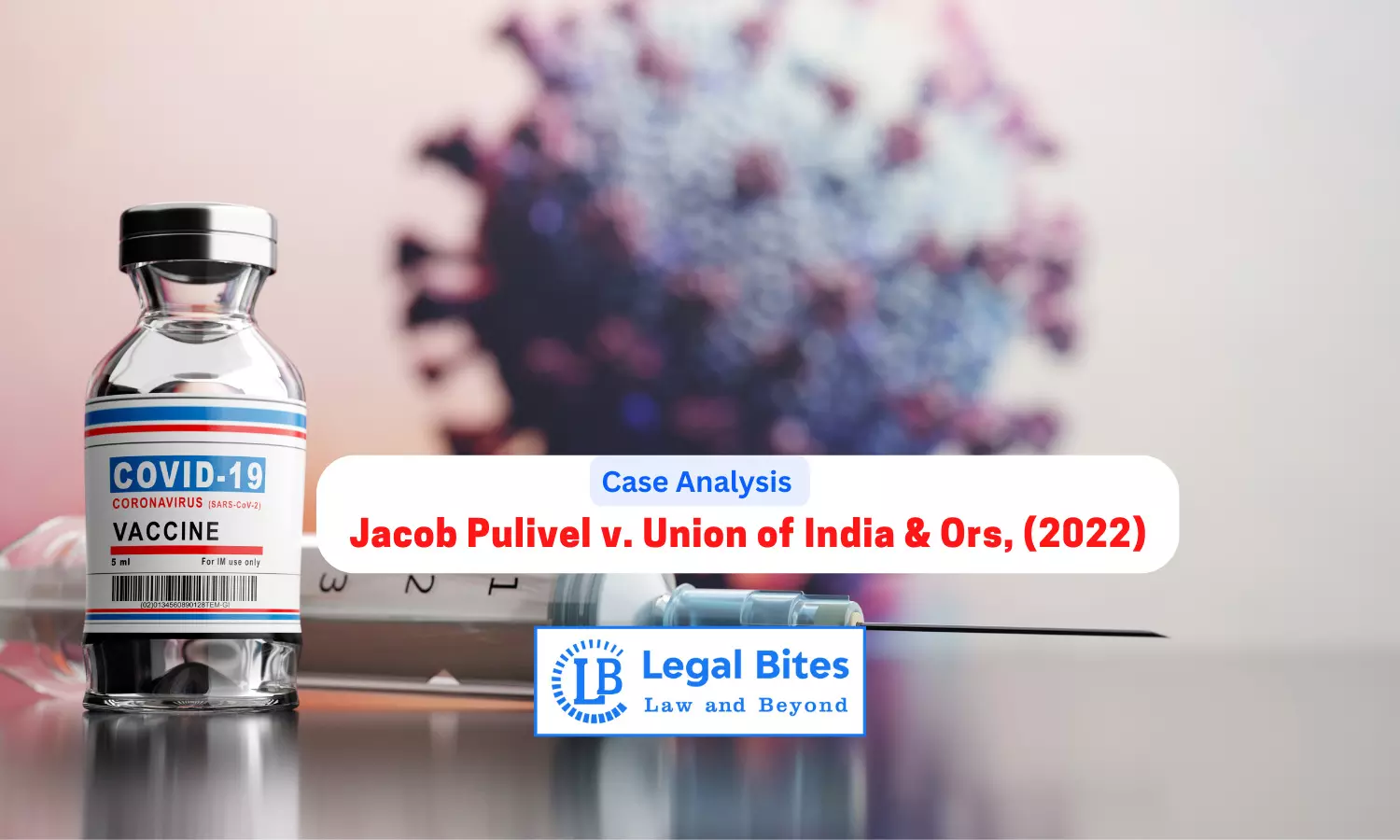Case Analysis: Jacob Pulivel v. Union of India & Ors, (2022) | Vaccination Policy of the Government of India
The Case Analysis: Jacob Pulivel v. Union of India & Ors. (2022) closely examined the vaccination policy of the government of India, the dissemination of clinical trial data, the veracity of emergency approvals of the vaccines, and the reporting of adverse impacts of vaccination.

The Case Analysis: Jacob Pulivel v. Union of India & Ors. closely examined the vaccination policy of the government of India, the dissemination of clinical trial data, the veracity of emergency approvals of the vaccines, and the reporting of adverse impacts of vaccination. This case is the result of the Covid-19 pandemic. It is related to vaccines that were administered to people to prevent coronavirus.
Court: Supreme Court of India
Citation: Writ Petition (Civil) No. 607 of 2021
Date of Judgement: 02nd May 2022
Bench: Justice L. Nageswara Rao, Justice B.R. Gavai
Facts
- A writ petition in the nature of a civil case was filed before the Supreme Court of India by the petitioner Jacob Pulivel, who was a member of the National Technical Advisory Group on Immunization (NTAGI) and was advising the Government of India on vaccines.
- The writ petition put forth the adverse consequences of the emergency approvals of vaccines in India and highlighted the need for transparency in publishing clinical trial data of vaccines and the lack of transparency in the constitution of expert bodies. It focused on the imperfect evaluation of adverse events following immunization.
- The writ petition further stated that coercive immunization violates the principle of informed self-incrimination of individuals as protected by Article 21 of the Constitution of India.
- The writ petition accounts that natural immunity long last compared to vaccine immunity; thus, the mandate to get oneself vaccinated is meaningless since it is ineffective and cannot prevent covid-19 transmission.
- The Respondents, on the other hand, were denying every contention raised by the petitioner in the writ petition.
Issues Involved
- Whether the present writ petition is maintainable?
- Whether executive decisions based on expert opinion are within the domain of Judicial Review?
- Whether mandate to get oneself vaccinated violative of Article 21 of the Constitution of India?
- Whether the monitoring system of adverse events following immunization faulty?
Laws Applied
Judicial Review applicable to Policy Decision
The Court referred to a series of precedents wherein the Judicial review is applied to executive policy decisions. Some of the cases referred by the Supreme Court are Delhi Development Authority v. Joint Action Committee, Allottee of SFS Flats, (2008) 2 SCC 672, wherein the Court held that an executive order termed as a policy decision is not beyond the pale of judicial review.
In RE: Distribution of Essential Supplies & Services during Pandemic, (2021) 7 SCC 772, the court held that
"policy-making continues to be the sole domain of the executive and the judiciary does not possess the authority or competence to assume the role of the executive. However, it continues to exercise jurisdiction to determine if the chosen policy measure conforms to the standards of reasonableness, militates against manifest arbitrariness and protects the right to life of all persons".
Right to Privacy overrides public health
The Court referred to a series of precedents and placed reliance on the following verdicts: Personal autonomy was read into Article 21 by this Court in Common Cause v. Union of India, (2018) 5 SCC 1, by placing reliance on National Legal Services Authority v. Union of India, Writ Petition (Civil) No. 400 of 2012 and Aruna Ramachandra Shanbaug v. Union of India, (2011) 4 SCC 454. This Court, in Common Cause Case, emphasized the right of an individual to choose how he should live his own life, without any control or interference by others. It recognized the right of an individual to refuse unwanted medical treatment and not to be forced to take any medical treatment that is not desired
Judgment
With respect to the maintainability issue, the Supreme Court agreed to proceed further with the contentions of the petitioner because the court believed that the issues raised by the Petitioner have a bearing on public health and pertain to the fundamental rights of the country's populace.
With respect to the second issue, Court held that the although this court lacks the expertise to arrive at conclusions from divergent opinions of scientific issues that do not prevent this Court from examining the issues raised in this Writ Petition, especially those that concern violation of Article 21 of the Constitution of India.
With respect to the third issue, the Supreme Court held in the following words:
"(a) Bodily integrity is protected under Article 21 of the Constitution of India and no individual can be forced to be vaccinated.
(b) Personal autonomy of an individual involves the right of an individual to determine how they should live their own life, which consequently encompasses the right to refuse to undergo any medical treatment in the sphere of individual health.
(c) Persons who are keen to not be vaccinated on account of personal beliefs or preferences, can avoid vaccination, without anyone physically compelling them to be vaccinated. However, if there is a likelihood of such individuals spreading the infection to other people or contributing to the mutation of the virus or burdening the public health infrastructure, thereby affecting communitarian health at large, protection of which is undoubtedly a legitimate State aim of paramount significance in this collective battle against the pandemic, the Government can regulate such public health concerns by imposing certain limitations on individual rights that are reasonable and proportionate to the object sought to be fulfilled."
With respect to the fourth issue, the court held that "the role of the Pharmacovigilance Programme of India and the CDSCO, as elaborated upon by the Union of India, collates and studies previously unknown reactions seen during monitoring of AEFIs at the time of vaccine administration and we trust the Union of India to ensure that this leg of the AEFI surveillance system is not compromised with while meeting the requirements of the rapid review and assessment system followed at the national level for AEFIs."
Conclusion
Jacob Pulivel v. Union of India & Ors. is a landmark case on the Covid-19 vaccination drive. The judiciary has rightfully balanced the interest of the public with government policy. However, the court specifically stated that the right to not get vaccinated is subsistent till the covid-19 cases remained low. The government is at liberty to bring any restrictions to avoid infection from spreading by bringing guidelines to prohibit unvaccinated people from attending workplaces.
Important Links
Law Library: Notes and Study Material for LLB, LLM, Judiciary, and Entrance Exams

